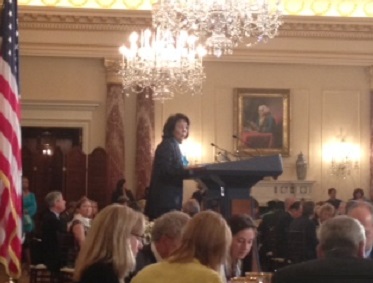Change in Ocean Governance: The European Experience (SPEECH)

Commissioner Damanaki shared her views and insight on ocean issues and ocean conservation in a speech during the "Political Change Makers" session at the "Our Ocean" International Oceans Conference in Washington. Commissioner Damanaki drew upon the reform process of the Common Fisheries Policy and its focus on sustainability, the fight against illegal fishing, the EU’s role in international fisheries governance, and the Blue Growth strategy. Other speakers at the session included US Senators Sheldon Whitehouse (Rhode Island) and Lisa Murkowski (Alaska) speaking of their roles as co-chairs of the Senate Oceans Caucus.

Our Ocean, International Oceans Conference
Washington, 16 June 2014
Panel: "Political Change Makers"
Ladies and gentlemen,
Whenever I’m asked to speak about the state of the oceans, I come running. It matters. And having the opportunity to speak to such a distinguished audience is of course a special honour. But on top of that, today I’m asked to speak about Change.
I know something about that. Looking back at my mandate as European Commissioner, I can tell you it’s been a few intense years of total, systematic, against-the-current change.
I won’t lie to you: it was not easy. From the start I felt that a multi-layered approach was needed: seas and oceans are complex systems, issues are multi-fold. So we had to work on several fronts in parallel. Modernizing our fisheries system has been one of them.
Europe’s system was out-dated and probably flawed. But it was a ‘system’ that people had gotten used to. Reforming it took years of preparation and several months of negotiations; we had to get 28 different countries to agree on a number of novelties and sacrifices. We had to convince the players that change was unavoidable to secure long-term benefits. We had to win public support. But now the change is here.
Now exploitation of fish stocks is being cut back to levels determined by scientists. Long-term plans allow for the recovery of weakened stocks. Discards are being phased out through a series of tools and technical solutions.
And we are not just caring for our own waters. In ocean governance there is no real progress without multilateral progress.
This is why over the last few years we have geared up our role in international organisations and stepped up bilateral cooperation, for instance with the US.
Indeed we believe that the modern approaches based on precaution and eco-system balance are worth exporting worldwide. We believe that science-based decision making should be the rule. And we believe that a fail-safe enforcement and control system are key, as well as regular performance review. Without total compliance by all parties any rule becomes worthless.
So I can promise we will keep on pushing for the Regional Fisheries Management Organisations to become the pinnacle of sound governance and sustainable exploitation.
True, they are not perfect. But they can yield good results.
In ICCAT, for instance, the tough measures taken for Eastern blue-fin tuna at the beginning of my term were a turning point for the health of this emblematic stock – and one of the highlights of my own work. I’d like to see this trend continue in the future.
And it goes way beyond tuna. You see, two thirds of the fish that Europe eats comes from outside the EU. So we believe that what happens in the rest of the world is our business too.
Accordingly, we have been practicing “zero tolerance” on illegal fishing internationally.
We have gone as far blocking all imports from three nations that were particularly oblivious to their international commitments. And we have already warned another eight that they might be next.
We have assisted dozens of world nations to improve their control systems. And we are working with NGOs, with Interpol, with FAO.... We need all the help we can get because illegal fishing is a global problem that undermines everybody’s conservation efforts, especially on the high seas.
For the governance of the high seas, enforcing UN rules like the Convention on the Law of the Sea and the Fish Stock Agreement is crucial. Those vast stretches of water, essential to biodiversity and marine life need common rules of the game. And this is a principle that goes beyond fish. We need common rules to govern all our activity in the high seas.
Ladies and gentlemen,
I cannot mention control and enforcement without touching upon another issue especially dear to me – and I’m sure to Americans: that of security.
The concept of maritime threats has now evolved from simple transport hazards to piracy, terrorism, drugs, human trafficking and organised crime.
So the EU has been developing the broadest possible vision of what security is about and what the response to threats and risks should be; and has paved the way for a European Maritime Security Strategy.
Again, we haven’t worked in isolation and have sought the support of key allies such as the US and NATO.
And again, elaborating something as new and ground breaking as this at EU level was no easy task: it required a radical shift of attitude from many players, traditionally used to working alone in sectors and countries as diverse as can be.
But it is happening; and as a result, we are going towards unprecedented cooperation between military and civilian bodies. This will not only ensure that Europe is able to develop the capabilities it requires to protect its strategic interests and its citizens. It is also a driver for economic growth, jobs and innovation.
Which leads me to my final point: the growth potential of seas and coasts.
This growth could be huge according to our studies, but it won’t happen by itself.
We need to accompany it, channel it, and create the right conditions and funding options for business to take up the innovation challenge in a sustainable way.
To give an extra push to the most promising sectors, we have prepared tailored policies for aquaculture, ocean energy and maritime tourism and are now moving on to seabed mining and marine biotechnology.
Incidentally, ocean energy could guarantee us unlimited energy and seabed mining could replace our mineral supply. Both could have a transformative impact on our society - and you know what?
Over ninety percent of the world’s offshore wind power is installed off the coast of Europe. The machines that will be used to extract minerals in the world's first ever deep-water mining operation around Papua New Guinea are built in the UK, using pumps from the Netherlands and caterpillar tracks from Italy.
We have hardly exited the crisis but Europe is innovating and has what it takes to enter the technological race and lead it too.
We are also looking at research and making sure that those undertaking research talk to each other and learn from each other.
And we are determined to improve the availability of marine data for entrepreneurs. By 2020 we intend to make a multi-resolution seabed map of European waters available – free of charge and free of restrictions on use.
Dear audience, I apologize for taking too long, but there was a lot of change to cover. There is no denying that taking up the ocean challenge is quite an endeavour, but I hope to have inspired you with a glimpse of hope.
If we all roll up our sleeves and do it, a brighter economic future will open up.
I am looking forward to hearing your views.


